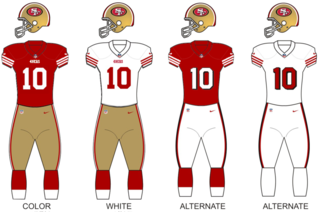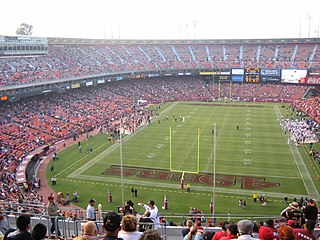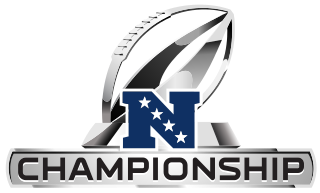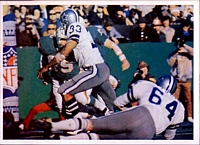
The Dallas Cowboys are a professional American football team based in the Dallas–Fort Worth metroplex. The Cowboys compete in the National Football League (NFL) as a member club of the league's National Football Conference (NFC) East division. The team is headquartered in Frisco, Texas, and plays its home games at AT&T Stadium in Arlington, Texas, which opened for the 2009 season. The stadium took its current name prior to the 2013 season. In January 2020 it was announced that Mike McCarthy had been hired as head coach of the Cowboys. He is the ninth in the team’s history. McCarthy follows Jason Garrett, who coached the team from 2010–2019.

The San Francisco 49ers are a professional American football team based in the San Francisco Bay Area. The 49ers compete in the National Football League (NFL) as a member of the league's National Football Conference (NFC) West division. The team plays its home games at Levi's Stadium in Santa Clara, California, located 38 miles (61 km) southeast of San Francisco. The name "49ers" comes from the prospectors who arrived in Northern California in the 1849 Gold Rush.
Super Bowl VI was an American football game between the National Football Conference (NFC) champion Dallas Cowboys and the American Football Conference (AFC) champion Miami Dolphins to decide the National Football League (NFL) champion for the 1971 season. The Cowboys defeated the Dolphins by the score of 24–3, to win their first Super Bowl. The game was played on January 16, 1972, at Tulane Stadium in New Orleans, Louisiana, the second time the Super Bowl was played in that city. Despite the southerly location, it was unseasonably cold at the time, with the kickoff air temperature of 39 °F (4 °C) making this the coldest Super Bowl played.

The Catch was the winning touchdown reception in the 1981 NFC Championship Game played between the Dallas Cowboys and San Francisco 49ers at Candlestick Park on January 10, 1982, as part of the playoffs following the 1981 NFL season. With 58 seconds left in the game and the 49ers facing 3rd-and-3, San Francisco wide receiver Dwight Clark made a leaping grab in the back of the end zone to complete a 6-yard touchdown pass from quarterback Joe Montana, enabling the 49ers to defeat the Cowboys, 28–27. The Catch is widely regarded as one of the most memorable events in National Football League (NFL) history. It came at the end of a 14-play, 83-yard drive engineered by Montana. The game represented the end of the Cowboys' domination in the NFC since the conference's inception in 1970, and the beginning of the 49ers' rise as an NFL dynasty in the 1980s.

The NFC Championship Game is the annual championship game of the National Football Conference (NFC) and one of the two semi-final playoff games of the National Football League (NFL), the largest professional American football league in the world. The game is played on the last Sunday in January by the two remaining playoff teams, following the NFC postseason's first two rounds. The NFC champion then advances to face the winner of the AFC Championship Game in the Super Bowl.

The National Football League playoffs for the 1970 season began on December 26, 1970. The postseason tournament concluded with the Baltimore Colts defeating the Dallas Cowboys in Super Bowl V, 16–13, on January 17, 1971, at the Orange Bowl in Miami, Florida.

The National Football League playoffs for the 1971 season began on December 25, 1971. The postseason tournament concluded with the Dallas Cowboys defeating the Miami Dolphins in Super Bowl VI, 24–3, on January 16, 1972, at Tulane Stadium in New Orleans, Louisiana.

The National Football League playoffs for the 1972 season began on December 23, 1972. The postseason tournament concluded with the Miami Dolphins defeating the Washington Redskins in Super Bowl VII, 14–7, on January 14, 1973, at the Los Angeles Memorial Coliseum in Los Angeles, California, becoming the only NFL team to finish a championship season undefeated and untied.

Troy Kenneth Aikman is a former American football quarterback who played in the National Football League (NFL) for 12 seasons with the Dallas Cowboys. He played college football at the University of Oklahoma and UCLA, and was drafted first overall by the Cowboys in the 1989 NFL Draft. Aikman was named to six Pro Bowls during his career while helping lead Dallas to a period of dominance in the 1990s. The longest-tenured quarterback in Cowboys franchise history, Aikman won three Super Bowl titles with the team and was the MVP of Super Bowl XXVII. He was inducted to the Pro Football Hall of Fame in 2006 and the College Football Hall of Fame in 2008.
This article contains an in-depth explanation of the history of the Dallas Cowboys, a professional American football team that competes in the National Football League (NFL).
The San Francisco 49ers are the first major league professional sports franchise to be based in San Francisco, and one of the first professional sports teams based on the West Coast of the United States.
The 1995 Dallas Cowboys season was the franchise's 36th season in the National Football League and was the second year under head coach Barry Switzer and final of the three Super Bowl titles they would win during 1992 to 1995. Dallas would be the first team to ever win three Super Bowls in a span of four seasons. Switzer guided the Cowboys to a fifth Super Bowl win by defeating the Pittsburgh Steelers in Super Bowl XXX. As of 2020, this is the last time the Cowboys appeared in the NFC Championship Game, and in turn, their last Super Bowl appearance.

The 1981 San Francisco 49ers season was the franchise's 32nd season in the National Football League, their 36th overall and their third under head coach Bill Walsh.
The 1971 Dallas Cowboys season was the franchise's 12th season in the National Football League, the first at the new Texas Stadium in suburban Irving, Texas and the 12th season under head coach Tom Landry. The Cowboys led the NFL with 406 points scored. Their defense allowed 222 points.
The Cowboys–Steelers rivalry is a rivalry in the NFL. The Cowboys currently lead the all-time series 17–16. The two teams met in the Super Bowl three times. They play in different conferences, they only meet once every four regular seasons and occasionally in the preseason.
The 1970 NFC Championship Game was the inaugural title game of the National Football Conference. Played on January 3, 1971, the game was hosted by the NFC West champion San Francisco 49ers. The 49ers played the NFC East champion Dallas Cowboys at Kezar Stadium in San Francisco, California. Along with the 1970 AFC Championship Game played on the same day, this game constituted the penultimate round of the 1970-71 NFL playoffs which had followed the 1970 regular season of the National Football League.
The 1972 NFC Championship Game was the third title game of the National Football Conference. Played on December 31, 1972, the game was hosted by the NFC East champion Washington Redskins who played their division rivals, the two-time defending NFC champion and defending Super Bowl champion Dallas Cowboys at RFK Stadium in Washington, D.C.. Along with the 1972 AFC Championship Game played on the same day, this game constituted the penultimate round of the 1972-73 NFL playoffs which had followed the 1972 regular season of the National Football League.
The 1973 NFC Championship Game was the fourth title game of the National Football Conference. Played on December 30, 1973, the game was hosted by the NFC East champion Dallas Cowboys who played the NFC Central champion Minnesota Vikings at Texas Stadium in Irving, Texas. Along with the 1973 AFC Championship Game played on the same day, this game constituted the penultimate round of the 1973-74 NFL playoffs which had followed the 1973 regular season of the National Football League.
The 1975 NFC Championship Game was the sixth title game of the National Football Conference. Played on January 4, 1976, the game was hosted by the NFC West champion Los Angeles Rams who played the NFC East runner-up Dallas Cowboys at Los Angeles Memorial Coliseum in Los Angeles, California. Along with the 1975 AFC Championship Game played on the same day, this game constituted the penultimate round of the 1975-76 NFL playoffs which had followed the 1975 regular season of the National Football League.








